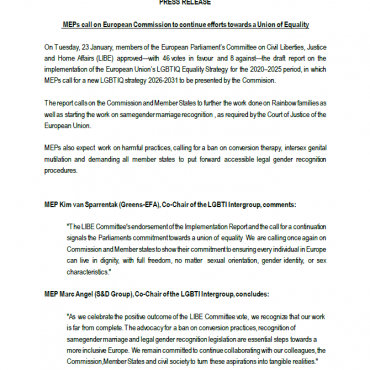Human rights in the world: European Parliament zooms in on LGBT rights
Today the European Parliament adopted its annual report on human rights in the world, paying close attention to EU action for the human rights of LGBT people. The report also comments on a range of new measures, including the creation of an EU Special Representative on Human Rights.
 In recent years the European Union has taken several positive steps to protect the human rights of lesbian, gay, bisexual and transgender people in the world.
In recent years the European Union has taken several positive steps to protect the human rights of lesbian, gay, bisexual and transgender people in the world.
The European Parliament takes stock of this progress, and suggests additional action in the coming year.
The European Parliament acknowledges that the EU has consistently stood up for LGBT people’s human rights at the United Nations, as well as occasionally in bilateral relations.
The Parliament calls on the Council to change the ‘LGBT toolkit’, adopted in 2010, into binding guidelines, and reasserts that the EU relationship to the Africa, Caribbean and Pacific group of states entails non-discrimination, including on the basis of sexual orientation.
Ulrike Lunacek MEP, Co-president of the European Parliament’s LGBT Intergroup, commented: “The European Union has done praiseworthy efforts for LGBT rights in the world. In particular, the toolkit adopted by the Council Working Party on Human Rights in 2010 has been used efficiently in a number of countries. The Council should now consider upgrading such a useful tool.”
Regarding gender identity, the European Parliament repeats its earlier call to the Commission to work with the World Health Organization to withdraw ‘gender identity disorder’ from the International Classification of Diseases, and seek a non-pathologising reclassification.
Finally, the Parliament also asks that people fleeing persecution because of their sexual orientation or gender identity be granted asylum, and that the Commission produces a comprehensive roadmap against homophobia and transphobia, including in the field of external relations.
Dennis de Jong MEP, Vice-president of the LGBT Intergroup, added: “Of course, the European Union can and should still do more. When it comes to LGBT rights at home, welcoming those who flee genuine persecution in Uganda, Iran or Indonesia is a duty of the EU. We must show international solidarity, and continue improving things at home in the meantime.”
Read more:






